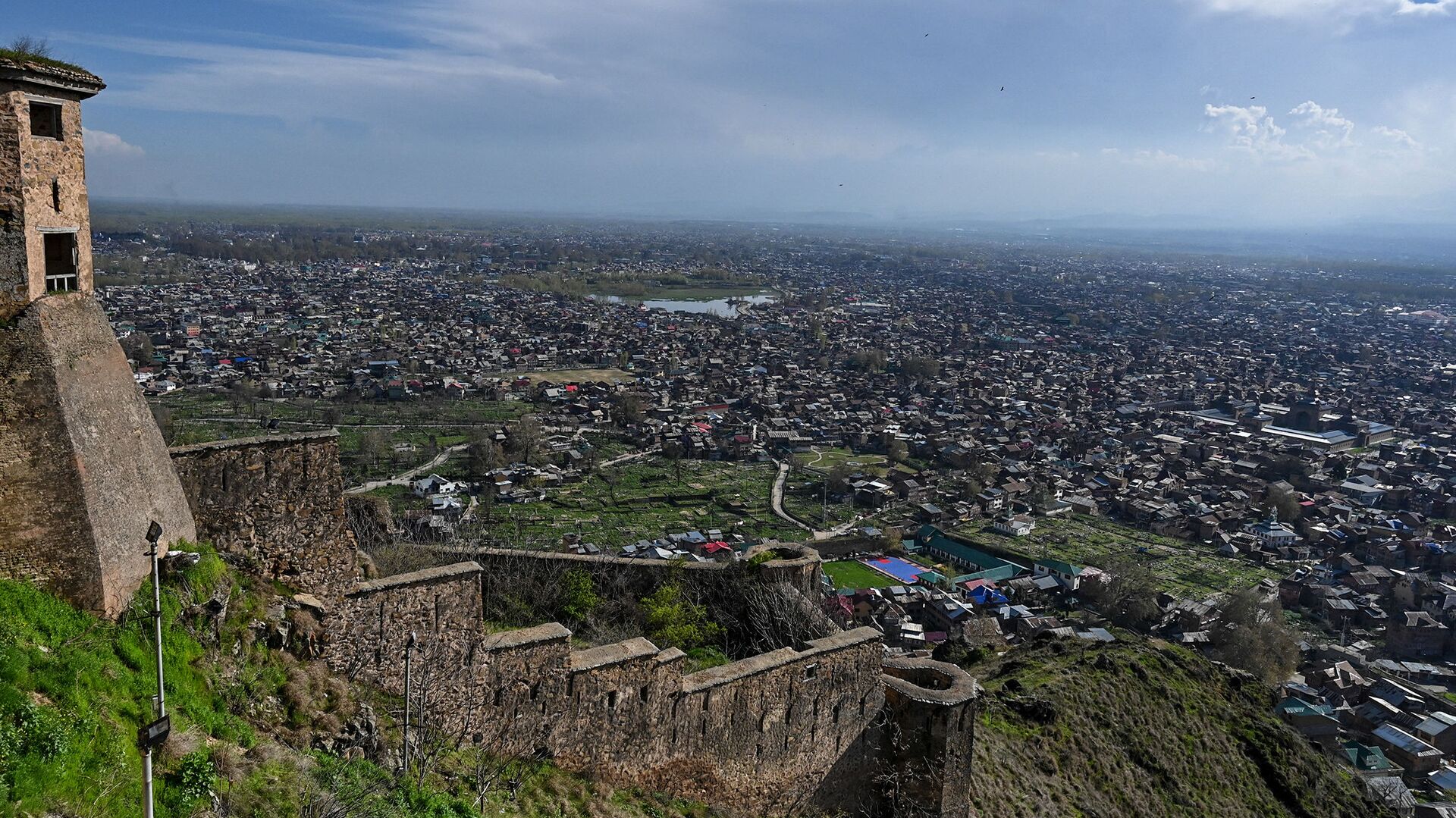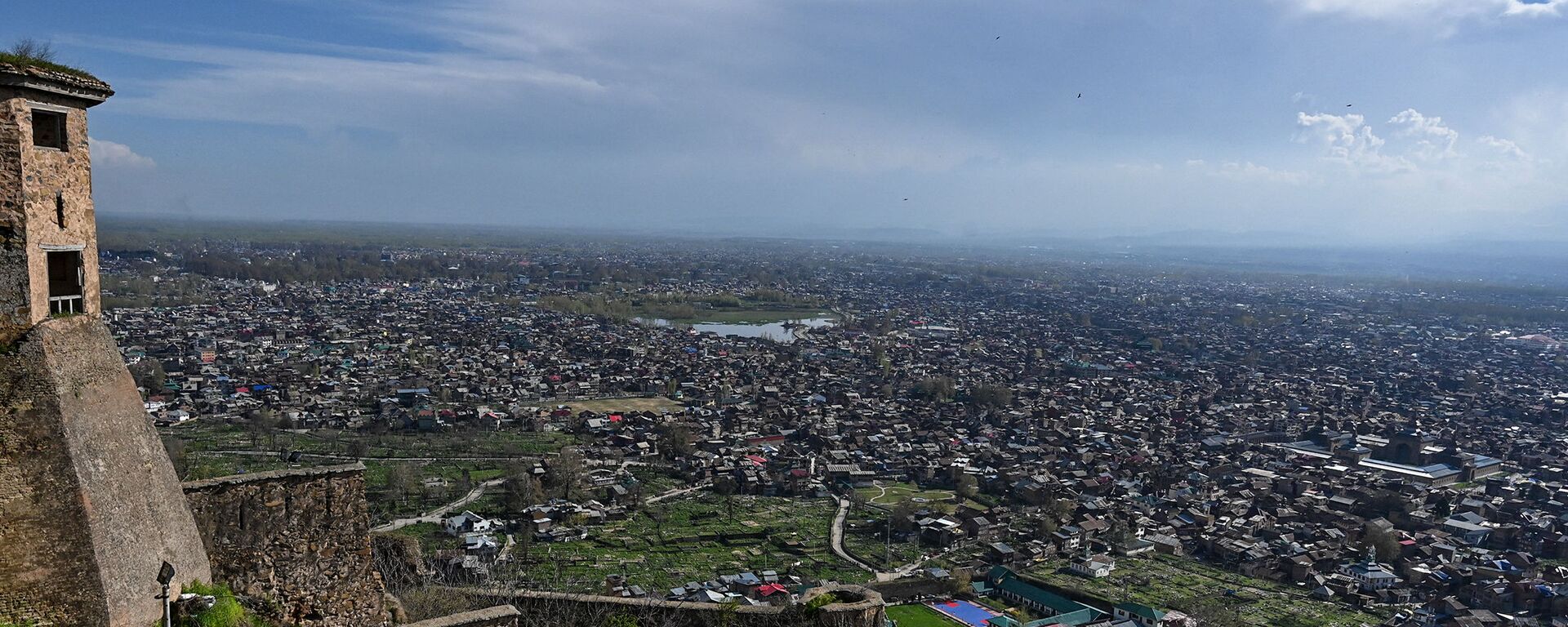https://sputnikglobe.com/20220805/muslim-nations-tell-india-that-revoking-kashmirs-autonomy-wont-alter-regions-disputed-status-1098132803.html
Muslim Nations Tell India That Revoking Kashmir's Autonomy Won't Alter Region’s ‘Disputed Status’
Muslim Nations Tell India That Revoking Kashmir's Autonomy Won't Alter Region’s ‘Disputed Status’
Sputnik International
Jammu and Kashmir was administered as a state between 1954 and August 2019, when Prime Minister Narendra Modi’s government revoked its semi-autonomous status... 05.08.2022, Sputnik International
2022-08-05T09:00+0000
2022-08-05T09:00+0000
2022-08-06T14:40+0000
india
pakistan
narendra modi
kashmir
https://cdn1.img.sputnikglobe.com/img/07e5/07/0c/1083367538_0:182:2205:1422_1920x0_80_0_0_6176651ebcd42f392feb148b04b9a9d7.jpg
The 57-member Organisation of Islamic Cooperation (OIC) has said that the Indian government’s decision to rescind the semi-autonomous status of Jammu and Kashmir won’t alter the region’s “disputed status”.In 2019, New Delhi not only scrapped the semi-autonomous status of Jammu and Kashmir, but also decided to split the former state into two federally administered territories - Jammu and Kashmir, and Ladakh.Both moves were objected to by India's arch-rival Pakistan, which administers northern parts of the Kashmir region.“The General Secretariat [of the OIC] reiterates its call on the international community to take concrete steps for the resolution of the Jammu and Kashmir dispute in accordance with the relevant UN Security Council resolutions,” said the group, which describes itself as the “collective voice of the Muslim world”.He complained that New Delhi had issued domicile certificates to non-Kashmiris and conducted a gerrymandering exercise to create “Hindu-dominated constituencies” since 2019 to alter the region’s status.New Delhi has consistently urged Pakistan to vacate the areas in the Kashmir region’s north that have been under Islamabad’s control since October 1947 when Islamist militants, reported to be backed by the newly independent Pakistani government, overran parts of Kashmir before being stalled by Indian forces.According to the United Nations (UN) Security Council Resolution 53 passed in 1948, Pakistan has to vacate its troops from Jammu and Kashmir, which is to be followed by a phased withdrawal of Indian forces before a “plebiscite” can take place.Although Islamabad has accused India of not adhering to the UNSC resolution on Jammu and Kashmir, Pakistani forces have also continued to maintain a huge military presence in the disputed areas.New Delhi, for its part, has maintained that the Kashmir dispute is a “bilateral matter” between India and Pakistan, and that it would brook no “interference” in the matter.India Defends Its Kashmir DecisionIn the meantime, the Indian government has said its decision to revoke Article 370 has led to a decrease in the number of terrorist incidents and helped the region to integrate with the rest of the country.New Delhi accuses Pakistan of backing terrorist groups which operate against Indian interests in Jammu and Kashmir, a charge Islamabad denies.India's Tourism Minister Gangapuram Kishan Reddy said that tourism in Jammu and Kashmir has received a “big boost” since Article 370 was scrapped. He highlighted a “record” tourist footfall over the past year or so.A video released on Friday by the Press Information Bureau (PIB), New Delhi’s federal media wing, said that the August 2019 decision has led to the creation of “one nation” and “one law” for the entire country.Prime Minister Narendra Modi has said that the decision has brought about “unprecedented peace and progress” in the region.
https://sputnikglobe.com/20210805/historic-day-modi-hails-his-kashmir-move-as-imran-slams-india-for-destroying-regional-stability-1083533243.html
pakistan
kashmir
Sputnik International
feedback@sputniknews.com
+74956456601
MIA „Rosiya Segodnya“
2022
News
en_EN
Sputnik International
feedback@sputniknews.com
+74956456601
MIA „Rosiya Segodnya“
Sputnik International
feedback@sputniknews.com
+74956456601
MIA „Rosiya Segodnya“
india, pakistan, narendra modi, kashmir
india, pakistan, narendra modi, kashmir
Muslim Nations Tell India That Revoking Kashmir's Autonomy Won't Alter Region’s ‘Disputed Status’
09:00 GMT 05.08.2022 (Updated: 14:40 GMT 06.08.2022) Jammu and Kashmir was administered as a state between 1954 and August 2019, when Prime Minister Narendra Modi’s government revoked its semi-autonomous status, temporarily granted by Article 370 of the Indian Constitution, through a parliamentary vote. Under the now defunct Article 370, Jammu and Kashmir had a separate flag and constitution.
The 57-member Organisation of Islamic Cooperation (OIC) has said that the Indian government’s decision to rescind the semi-autonomous status of Jammu and Kashmir won’t alter the region’s “disputed status”.
In a statement released by the OIC on the third anniversary of New Delhi’s decision to revoke Article 370 of the Indian constitution, the Jeddah-headquartered grouping reiterated its stance of supporting the “inalienable right to self-determination” of the people of Kashmir.
In 2019, New Delhi not only scrapped the semi-autonomous status of Jammu and Kashmir, but also decided to split the former state into two federally administered territories - Jammu and Kashmir, and Ladakh.
Both moves were objected to by India's arch-rival Pakistan, which administers northern parts of the Kashmir region.
“The General Secretariat [of the OIC] reiterates its call on the international community to take concrete steps for the resolution of the Jammu and Kashmir dispute in accordance with the relevant UN Security Council resolutions,” said the group, which describes itself as the “collective voice of the Muslim world”.
Pakistan’s Foreign Minister Bilawal Bhutto Zardari said on Friday that New Delhi was “leaving no stone unturned in pursuing demographic changes” in the region in a bid to alter its “internationally recognized” disputed status.
He complained that New Delhi had issued domicile certificates to non-Kashmiris and conducted a gerrymandering exercise to create “Hindu-dominated constituencies” since 2019 to alter the region’s status.
New Delhi has consistently urged Pakistan to vacate the areas in the Kashmir region’s north that have been under Islamabad’s control since October 1947 when Islamist militants, reported to be backed by the newly independent Pakistani government, overran parts of Kashmir before being stalled by Indian forces.
According to the United Nations (UN) Security Council Resolution 53 passed in 1948, Pakistan has to vacate its troops from Jammu and Kashmir, which is to be followed by a phased withdrawal of Indian forces before a “plebiscite” can take place.
Although Islamabad has accused India of not adhering to the UNSC resolution on Jammu and Kashmir, Pakistani forces have also continued to maintain a huge military presence in the disputed areas.
New Delhi, for its part, has maintained that the Kashmir dispute is a “
bilateral matter” between India and Pakistan, and that it would brook no “interference” in the matter.
India Defends Its Kashmir Decision
In the meantime, the Indian government has said its decision to revoke Article 370 has led to a decrease in the number of terrorist incidents and helped the region to integrate with the rest of the country.
New Delhi accuses Pakistan of backing terrorist groups which operate against Indian interests in Jammu and Kashmir, a charge Islamabad denies.
India's Tourism Minister Gangapuram Kishan Reddy said that tourism in Jammu and Kashmir has received a “big boost” since Article 370 was scrapped. He highlighted a “record” tourist footfall over the past year or so.
A video released on Friday by the Press Information Bureau (PIB), New Delhi’s federal media wing, said that the August 2019 decision has led to the creation of “one nation” and “one law” for the entire country.
Prime Minister Narendra Modi has said that the decision has brought about “unprecedented peace and progress” in the region.




